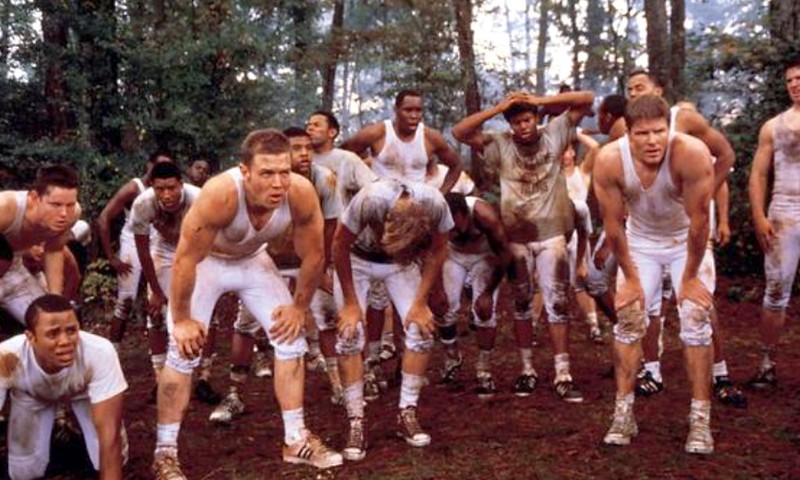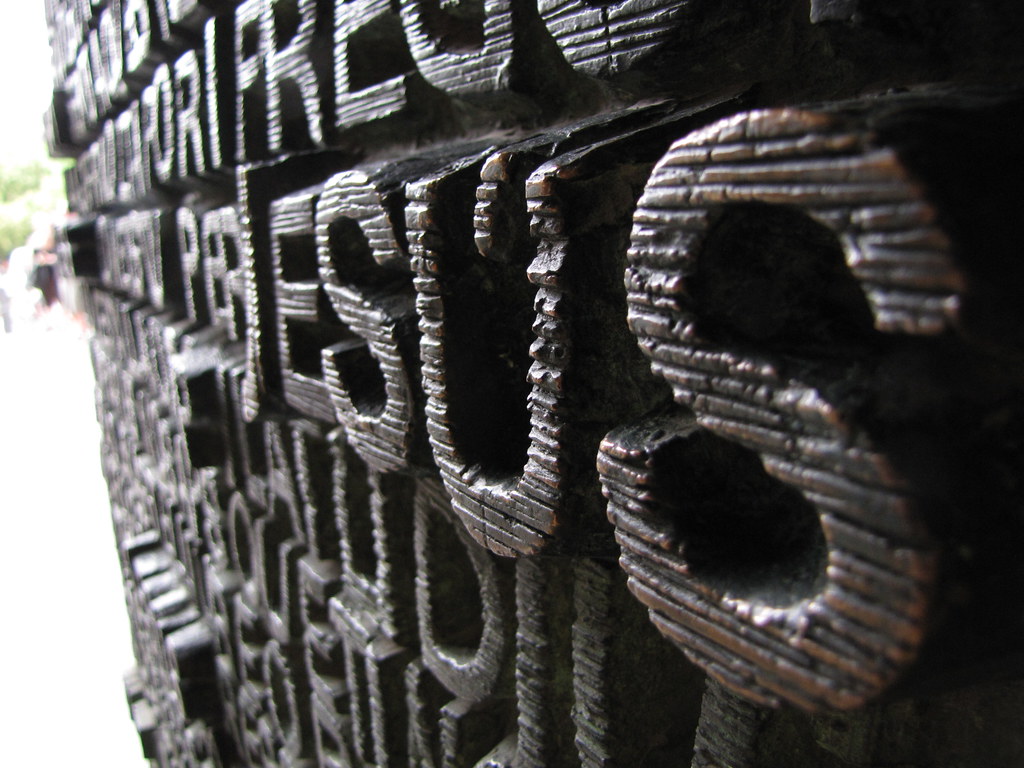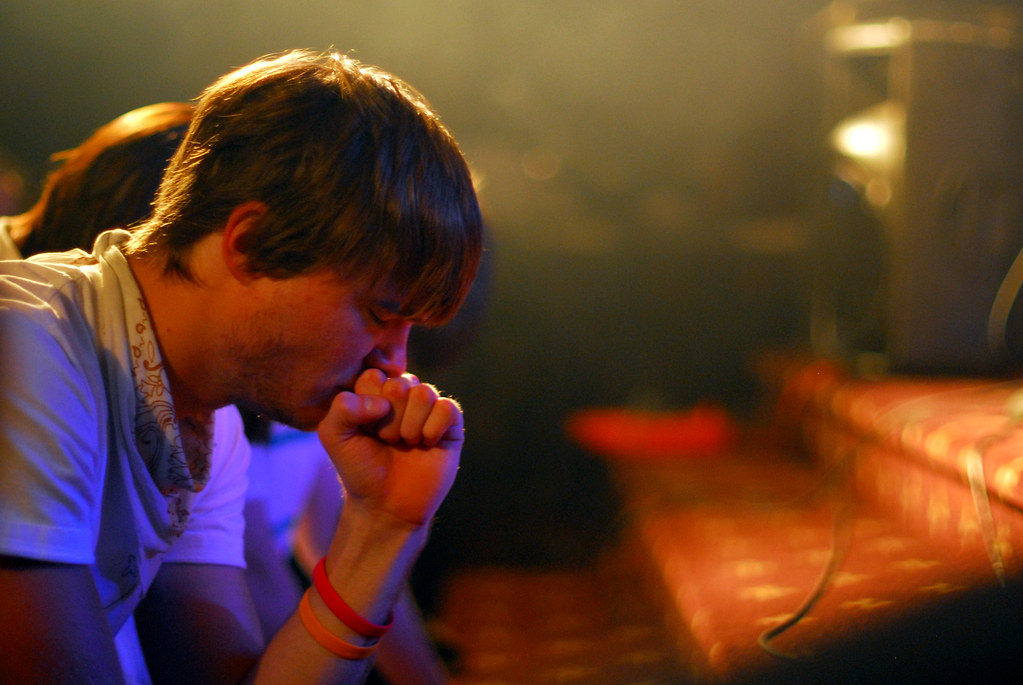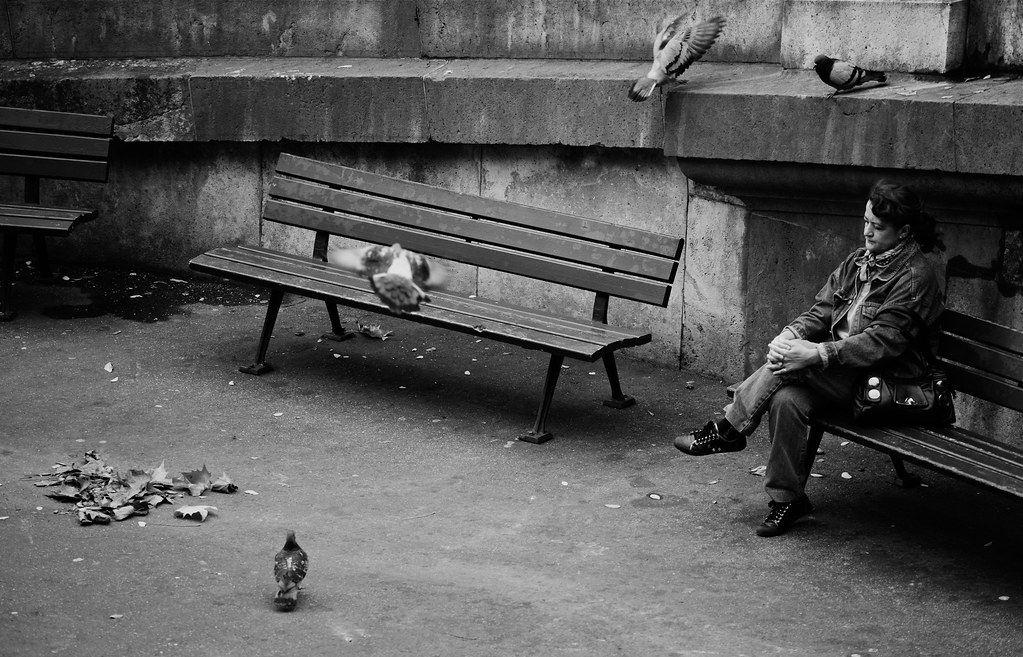Remember 'Remember the Titans'?
Culture change is tough - but it is worth it!!! I was reminded of this as I watched the movie Remember the Titans. A coach dropped into a chaotic situation must bring culture change for the team to survive... but he doesn't just want it to survive he wants it to succeed, and to dominate. In a way we want our ministries to do likewise so what ideas for culture change can we take from Coach Boon?

Thinking about sacrifice
If Jesus is King, what does that mean for what we want to do with out lives? [Image by Chris Bellerophon Dotson on flickr]

Back to the Mission
Reminded again and again about what we are created for. We are created for worship! But because there are some people who do not worship, we have been given a mission... to go and show people they were created to worship! - photo on Flickr by llamatofu

Appeasement verses Satisfaction
Do we look to appease our emotions, troubles, discomforts with earthy things that may provide some release temporarily, or do we look to God who is the source of complete satisfaction? [Image by donald_palansky_photography on flickr]

Sunday, 31 October 2010
Question: Please Answer
How would you relate to that person from then on?
Saturday, 30 October 2010
Who do you belong to?
Just something to ponder....
Friday, 29 October 2010
Friday Reflection: Jesus is Real
With the end of the college semester coming up this was a good post to look back and reflect on. Sometimes in all the academia of Bible College it is easy to forget the simple, relational Jesus who is very real and really wanting to communicate. So have a read and reflect on the notion that Jesus is really real... let me know what thoughts come to mind.
----------------------------------------------------------------------
Last night Whitehill had a dvd service which I wasn't too keen about so took the opportunity to go and visit my friends over at City North Baptist in Kedron.
I always enjoy visiting City North, not only are heaps of my WEC co-horts there, but the services always feel so fresh and communicative (maybe it's cause I'm just visiting??). I always get an awesome sense of God's presence there, and enjoy their humbling and honest praise times, and good Biblical Message from the two pastors.
Last night was no different, but half way through the service, when Pastor Stewart was giving a small communion talk I suddenly realised something I think I'd been slowly forgetting.
Jesus is real!
Yes that's right, I suddenly had this amazing awareness that Jesus Christ is a real living person, right here in 2007. It seems pretty obvious doesn't it? Like I'm a Bible believing Christian who's forgotten Jesus is real... um that sounds pretty lame. Well in a way it is, and in a way it's a disturbing thought that I could even start to forget that - but I also think there are many other Christians out there doing the exact same thing.
I think I was just getting in the habbit of going with the flow. I was doing the church thing, I was even doing my daily Bible readings and prayer times - but I think I was doing it almost like a robot, just going through pre-planned motions, set before me by a traditionalistic and ritual environment I've allowed myself to live in.
Maybe it's the fact that I've spent so much time at Whitehill, serving, playing drums, leading the youth group, going to Bible studies, sitting in virtually the same row every service... I don't really know what it is...
But on Sunday, as Paster Stewart spoke on the simplistic truths of what being a Christian and partaking in communion is, I suddenly realised I'd been pushing, that personal, relational, communicative side of my 'Christian' life away and just gliding along in a self-centred, ignorant tradition.
He then went on and gave his message from Matthew 28:16-20 (aka the Great Commission) and the simplest of concepts blew my mind.
- Jesus really did live - it's not some story or fable, it happened... Jesus really did walk on water, he really did take some mud, stick it in a blind man's eyes and give him sight - he really did accept the blame for my sins and stuff ups and take the punishmet on a disgustingly cruel cross, and he did rise again, conquor death and return to heaven giving us a command to go into all the world making disciples and baptising them into the name of the Father, the Son and the Holy Spirit - All that really happened.
And if all that really happened I need to look at life in such a different way. I know I've realised this before, but I need to take stock again, and get on with it properly.
At the end of the service we sand a song called The Stand off the latest United Live album, and maybe it was because of the simple revolations I'd had, but the words really cut into me.
"And I'll stand, with arms high and heart abandoned
In awe of the one who gave it all
And I'll stand, my soul Lord to you surrendered
All I am is yours"
I am in awe... I really am, and it's the basics that have me in awe, not some super-spiritual act, no some deep theological insight... just the basic Jesus loves me this I now, for the Bible tells me so....
----------- original post here.
Jesus healing the paralysed man
 It's a story that highlights our greatest need. This man was hoping to be heal, believed he would be heals and went to a pretty tremendous effort to get to Jesus to be healed. But Jesus knew his greatest need wasn't fixed legs, but forgiveness. And Jesus being God was the only person able to give that to him.
It's a story that highlights our greatest need. This man was hoping to be heal, believed he would be heals and went to a pretty tremendous effort to get to Jesus to be healed. But Jesus knew his greatest need wasn't fixed legs, but forgiveness. And Jesus being God was the only person able to give that to him.I used a personal testimony to illustrate throughout so if you'd like to hear the sermon go here to get the MP3 or listen online - City North Baptist Sermons: Dean Sandham - Our Greatest Need:Forgiveness.
Tuesday, 26 October 2010
How does Deuteronomy 12 relate to us today?
______________________________________________________________
Deuteronomy 12 expected that the people of Israel were instructed on the importance of their one true centre of worship. Christensen (2001, 244) explains that for the “…Christian this principle of one center [sic] of true worship is correct; but the center is not a place but rather a person who embodies the symbols of ancient Israelite worship.” Because of Jesus – who is described in Scripture as ‘our Passover lamb’ (1 Cor 5:7) – the need for personal animal sacrifices is no more; essentially he has become the one and only atoning sacrifice needed for believers.
The people of Israel were instructed to first rid their territory of every Canaanite religious site and to make sure they do not worship Yahweh ‘in their way’ (Deut 12:4), Christensen then raises the point “…to ponder on the part of those who would ‘contextualize’ [sic] the gospel in cross-cultural mission situations.” This does raise questions regarding those organisations who allow converts to Christianity to continue being involved in their cultural religious paradigms as long as they focus their worship on Jesus - in some cases albeit secretly. This would also have to include Christian leaders in the Western world who, in attempting to appeal to a postmodern audience, have subjectively changed their Gospel views to secure the salvation of good people (Buddhist, Christian, Agnostic or otherwise) and deny the existence of an eternal punishment or place of hell (Anderson 2006; McLaren 2007). If pagan rite and religion is to be cleansed before God chooses the place in which his name will dwell (Deut 12:5); would that then, today, not also imply we should worship Jesus according to the Gospel, without ‘adding or taking away from it’ (Deut 12:32)? “True religion is found in the conscious rejection of every false dependence” (Christensen 2001, 249).
How then is worship prescribed for Christians today? Brown (1993, 144) outlines that the same concepts of worship and religious practice which applied to Israel apply to us today;
…worship will not only honour God’s word; it will reflect God’s nature. He is holy, so their worship can never be impure. He is consistent, so their worship can never be contradictory, worshipping in one way but behaving in another. He is loving, so their worship will never have a harmful effect on others. He is righteous, so their worship must never ignore moral values…
These are the notions of the pagan religion God calls Israel away from (Deut 12:29-30), the idea of the importance of his central sanctuary and the emphasis on rejoicing at the offering of sacrifices (Deut 12:5-7).
One must also examine the elements of worship which are specifically mentioned for Jesus’ followers. Acts 2:42 speaks of believers devoting themselves to apostolic preaching, fellowship and the Lord’s Supper. James 1:27 says; “Religion that God our Father accepts as pure and faultless is this: to look after orphans and widows in their distress and to keep oneself from being polluted by the world.” In the light of Deuteronomy 12 one sees that these are similar to the statutes in place regarding the centralised sanctuary. The idea of teaching to fill the religious void of wider spread sacrifices, the fellowship of coming together to share sacrificial feasts, remembering atoning sacrifices and providing for those who are unable so they might worship as well can all be seen through these New Testament verses (Routledge 2009, 22-24).
D-Camp 2010
It was a good time of learning and fellowship - a highlights video has been made so check out what we got up to.
City North Baptist: D-Camp 2010 Highlights from City North Baptist Church on Vimeo.
Thursday, 21 October 2010
Sermon to be written...
Wednesday, 20 October 2010
Jesus' Resurrection Ensures our Justification
In only one passage does Paul explicitly connect Christ's resurrection with our justification (or our receiving a declaration that we are not guilty but righteous before God). Paul says that Jesus "was put to death for our trespasses and raised for our justification" (Rom 4:25). When Christ was raised from the dead, it was God's declaration of approval of Christ's work of redemption. Because Christ "humbled himself and became obedient unto death, even death on a cross" (Phil 2:8), "God highly exalted him..." (Phil 2:9). By raising Christ from the dead, God the Father was in effect saying that he approved of Christ's work of suffering and dying for our sins, that his work was completed and that Christ no longer had any need to remain dead. There was no penalty left to pay for sin, no more wrath of God to bear, no more guilt or liability to punishment - all had been completely paid for, and no guilt remained. In the resurrection, God was saying to Christ, "I approve of what you have done, and you find favour in my sight."
Grudem, Systematic Theology, p615
Still going...
Some days though it just seems like there's nothing at all to see or do, except keep putting one foot in front of the other. Read about their boring day on their blog.
Though it seems sometimes the boys get lucky and find something on the edge of the highway to keep them amused for a while...
Tuesday, 19 October 2010
Jesus' Resurrection Ensures our Regeneration
Peter says that "we have been born anew to a living hope through the resurrection of Jesus Christ from the dead" (1 Peter 1:3). Here he explicitly connects Jesus' resurrection with our regeneration or new birth. When Jesus rose from the dead he had a new quality of life, a "resurrection life" in a human body and human spirit that were perfectly suited for fellowship and obedience to God forever. In his resurrection, Jesus earned for us a new life just like his. We do not receive all of that new "resurrection life" when we become Christians, for our bodies remain as they were, still subject to weakness, aging, and death. But in our spirits we are made alive with new resurrection power. Thus it is through his resurrection that Christ earned for us the new kind of life we receive when we are "born again." This is why Paul can say that God "made us alive together with Christ (by grace you have been saved), and raised us up with him" (Eph 2:5-6; Col 3:1)
Grudem, Systematic Theology p214
Tuesday, 12 October 2010
God, through Jesus, saving us by Holy Love
For, although indeed ‘God is love’, yet we have to remember that his love is ‘holy love’, love which yearns over sinners while at the same time refusing to condone their sin. How, then, could God express his holy love – his love in forgiving sinners without compromising his holiness, and his holiness in judging sinners without frustrating his love? Confronted by human evil, how could God be true to himself as holy love?... For, despite the truth that God demonstrated his righteousness by taking action to save his people, the words ‘righteousness’ and ‘salvation’ cannot be regarded as simple synonyms. Rather his saving initiative was compatible with, and expressive of, his righteousness. At the cross in holy love God through Christ paid the full penalty of disobedience himself. He bore the judgement we deserve in order to bring us the forgiveness we do not deserve. On the cross divine mercy and justice were equally expressed and eternally reconciled. God’s holy love was ‘satisfied’.
p105
How was it satisfied?
How, people ask, can we possibly believe that God needed some kind of ‘satisfaction’ before he was prepared to forgive, and that Jesus Christ provided it by enduring as our ‘substitute’ the punishment we sinners deserved? Are not such notions unworthy of the God of the biblical revelation, a hangover from primitive superstitions, indeed frankly immoral?
p131
To be sure, ‘self-satisfaction’ in fallen human beings is a particularly unpleasant phenomenon, whether it refers to the satisfying of our instincts and passions or to our complacency…. But there is no lack of self-control or humility in God, since he is perfect in all his thoughts and desires. To say that he must ‘satisfy himself’ means that he must be himself and act according to the perfection of his nature or ‘name’
p146
So God sent his Son out of love for us... His love for us isn't depended on the cross... but the cross is dependent on his love for us - that's amazing
No forgiveness without blood meant no atonement without substitution. There had to be life for life or blood for blood. But the Old Testament blood sacrifices were only shadows; the substance was Christ. For a substitute to be effective, it must be an appropriate equivalent. Animal sacrifices could not atone for human beings, because a human being is ‘much more valuable… than a sheep’, as Jesus himself said (Matt.12:12). Only ‘the precious blood of Christ’ was valuable enough (1 Pet.1:19).
p163
Grover, the monster you want to be like.
::I'm on a horse
"MOO"
::...cow
haha classic!
Monday, 11 October 2010
Brisbane; beautiful one day.... biblically flooding the next!
Friday, 8 October 2010
Unsettled few days...
A backup, rebuild and few hours work later and everything seems to be back in order though. I think the only thing I lost was my Outlook email contacts list - but I think most of that is still around on an old drive somewhere.
Glad it's all sorted now, so I can focus on getting some assignments done and more importantly the car racing this weekend :-)
Tuesday, 5 October 2010
Malyon College Open Night
 Have you ever wonder what Bible College might be like? You may never have considered coming to Bible College, but you might just wonder about what goes on. If so, then for both the serious college considerer and the casual take a looker Malyon is having an Open Night.
Have you ever wonder what Bible College might be like? You may never have considered coming to Bible College, but you might just wonder about what goes on. If so, then for both the serious college considerer and the casual take a looker Malyon is having an Open Night.Come along and experience a portion of a lecture, have supper with the students, and spend some time with the principal who will answer any questions you might have.
Hey and I'll even be there :-p
Here are all the details. More can be found here.
-------------------------------------------------------------------------------
WHEN: Tuesday 19th October.
WHERE: Malyon College - 53 Prospect Rd Gaythorne
PROGRAM:
6.15 College lecture - join the evening class
7.00 Information about Malyon courses
8.00 Supper with evening class students
8.15 Interviews with faculty
WHAT:
-Find out about courses
-Get a taste for lectures
-Check out the campus and facilities
-Meet lecturers
-Chat with students
-Ask your questions
-Listen to what God is doing.
What is the Image of God #2
"Out of all the creatures God made, only one creature, man, is said to be made "in the image of God." What does that mean? We may use the following definition: The fact that man is in the image of God means that man is like God and represents God.
When God says, "Let us make man in our image, after our likeness" (Gen 1:26), the meaning is that God plans to make a creature similar to himself...
Theologians have spent much time attempting to specify one characteristic of man, or a very few, in which the image of God is primarily seen. Some have thought that the image of God consists in man's intellectual ability, others in his power to make moral decisions and willing choices. Others have thought the image of God referred to man's original moral purity, or his creation as male and female (see Gen. 1:27), or his dominion over earth..."
Grudem, Systematic Theology, 442-443.
So we are created to be like God and represent God. Of the notions given which do you think is the most apt way we are the image of God?
Sunday, 3 October 2010
What is the Image of God #1
So God created man in his own image,.... Which consisted both in the form of his body, and the erect stature of it, different from all other creatures; in agreement with the idea of that body, prepared in covenant for the Son of God, and which it was therein agreed he should assume in the fulness of time; and in the immortality of his soul, and in his intellectual powers, and in that purity, holiness, and righteousness in which he was created; as well as in his dominion, power, and authority over the creatures, in which he was as God's viceregent, and resembled him.
So are these the elements of being made in the image of God?
- the image of God's body/standing erect
- that God would become human and not another animal
- our soul is immortal
- our intelligence
- created perfect
- our power and status over all living creatures.
Saturday, 2 October 2010
Not very Pastoral
Very disturbing for those students and the family who found out about it all later. It's a terrible mistake yet this paragraph was the thing that disgusted me the most.
The Shipley family's priest told the family he didn't consider the son's burial proper without the remaining body part, so after the organ was returned, the Shipleys had to bury their son for the second time in three months, and "go through another anguishing funeral service," court papers said.
What kind of person puts a family through that again! I mean really that's disturbing on a very deep level from that priest.
The question of humanity
"There was a day in which people did not think of themselves in primarily individual terms. Instead what it meant to be a person was largely defined by one's relationship to such communities as family, history, parents, ethnicity, nationality, city, religion and trade...
However everything changed in the days of the church father Augustine... [He] did not look outward to his social network but rather inward to his feelings, convictions, longings, and the like. This elevated the importance of the autonomous individual in understanding the essence of humanity...
In light of this historical transition, the average person, including the average Christian, is far worldlier and less biblical in his understanding of who he is and why he exists than he is aware. He thinks in worldly categories rather than biblical categories because the culture in which he lives is so fundamentally unbiblical in its thinking Sociologist Christian Smith has said that the true religion of most people in the West today, regardless of what religion they profess to participate in, is moralistic therapeutic deism. By moralistic he means we are good individuals who can get better, not sinners who need actual salvation. By therapeutic he means that it is counseling and therapy, not God or the church, that enable our betterment. By deism he means that God is not really involved in our lives; we are essentially on our own with the occasional exceptions of God answering a prayer we send him or sending us a pithy insight to aid our betterment."
- p111-113 Doctrine.
Do you think our focus on the individual has changed our human makeup? It seems to certainly have changed the image of the human on earth. To the point where it continues to effect even those saved by Jesus.
Do you agree with this view?













